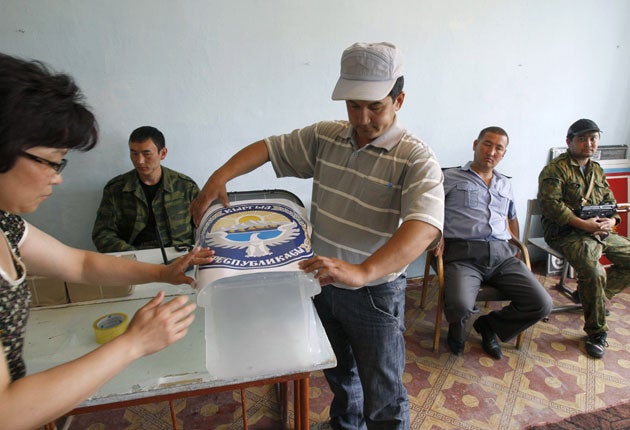Kyrgyzstan on alert ahead of vote on new constitution
Ballot intended to bring Central Asian country, torn by ethnic violence, closer to democracy

Your support helps us to tell the story
From reproductive rights to climate change to Big Tech, The Independent is on the ground when the story is developing. Whether it's investigating the financials of Elon Musk's pro-Trump PAC or producing our latest documentary, 'The A Word', which shines a light on the American women fighting for reproductive rights, we know how important it is to parse out the facts from the messaging.
At such a critical moment in US history, we need reporters on the ground. Your donation allows us to keep sending journalists to speak to both sides of the story.
The Independent is trusted by Americans across the entire political spectrum. And unlike many other quality news outlets, we choose not to lock Americans out of our reporting and analysis with paywalls. We believe quality journalism should be available to everyone, paid for by those who can afford it.
Your support makes all the difference.Voters in Kyrgyzstan go to the polls today to decide on changes to its constitution after the worst ethnic violence in the country's modern history.
Kyrgyzstan is on high-security alert for today's vote, with almost 8,000 police and a similar number of defence volunteers being deployed. Checkpoints have been set up throughout the capital, Bishkek, and in the southern cities of Osh and Jalal-Abad. Observers say the referendum is an important step on the road to democracy for the interim government.
Tension grew yesterday as investigators began the grisly task of exhuming bodies of victims of the recent violence. At least 275 people, and possibly hundreds more, were killed and thousands were displaced during the upheavals. Parts of the volatile south of the country are said to be in ruins.
At a graveyard on the outskirts of Osh, soldiers dug up and removed several recently buried victims, angering residents who have demanded a proper investigation before bodies were disturbed. "Soldiers came and dug them out. They took them away, those who had not been identified," said one man who asked not to be named. "Our people did not want it done unless there was an official commission." He said the victims were Uzbeks, the Kyrgyz minority that suffered the brunt of the violence.
The use of troops to carry out the exhumations is controversial as the Kyrgyz military faces accusations of complicity in attacks on Uzbek areas that left thousands of homes and businesses destroyed by arson. At least 60 people have been arrested on suspicion of organising the mass unrest.
The First Deputy Interior Minister, Baktybek Alymbekov, said yesterday that exhumations had begun because it was necessary to identify those killed and gain a better idea of the death toll. Many victims were not officially identified because many were buried quickly in keeping with Muslim tradition. "It is in the interests of these victims [to be identified], so I do not think it will provoke any discontent," Mr Alymbekov said.
The interim Kyrgyz government has said the real death toll from the ethic violence could be as high as 2,000.
The recent violence followed a bloody uprising in April that toppled President Kurmanbek Bakiyev. Now the interim government is accusing Mr Bakiyev's followers of instigating further turmoil to cause the constitutional referendum to be cancelled. Mr Bakiyev, in exile in Belarus, denies any links to the current troubles, but Kyrgyz authorities said they arrested the former leader's nephew on Friday and charged him with helping to organise rioting. Mr Bakiyev's son Maxim has sought asylum in Britain.
The country's interim leader, Roza Otunbayeva, rejected calls to postpone the referendum. She insists the vote must be held to create a new system of government that will give more power to a democratic parliament, a dramatic change in a Central Asian region otherwise dominated by ex-Soviet presidential strongmen.
Mrs Otunbayeva has vowed to deliver ballot boxes to Uzbeks afraid to vote after the bloodshed. Dilshat, 30, an Uzbek electrician, scoffed. "No one is going to vote. There is no trust in anything in the government," he said. "The Kyrgyz shot at us. They are simply jealous of our success and wealth. They want us out of this country."
Join our commenting forum
Join thought-provoking conversations, follow other Independent readers and see their replies
Comments